
by Regan Bervar | Dec 17, 2024 | Travel
by Regan Bervar

Walkable: Cherry Creek North is a walkable neighborhood with 600 stores from which to choose.
Denver has no shortage of sprawling neighborhoods across the city, and Cherry Creek North is no different. With hundreds of retailers, and a strong emphasis on small businesses, the district is home to a number of commerce stores and residents alike. With 300 days of sunshine in Denver, chances are it’s a good day to walk the tree-lined streets of Cherry Creek North.
Cherry Creek North has over 600 businesses, with 90% being small or micro businesses. According to Lisa Voss, Vice President of Marketing and Communications at Cherry Creek North, Cherry Creek North is more than just a 16 block area, but a neighborhood, a community, and central vibrant district.
“You’ve heard the term the 15 minute city,” Voss said. “We’re not really a city per se, but we are a bit of a 15 minute neighborhood. What that means is everything can happen here. We’re loaded with merchants and services and all kinds of fun, but we also have a post office, a library, and an elementary school.”
Cherry Creek North emphasizes community, safety, and a diverse array of retail and service offerings, and the shop owners in the area bring a sense of community to the neighborhood, with 220 of the 600 businesses being retail and service businesses. According to the small business report, 90% of those 220 retail and service shops are small businesses, and 64% go even further, and are micro businesses with 10 employees or fewer.
“We have what I believe is the largest collection of small and local businesses in one area, probably anywhere in Colorado, so we super celebrate them,” Voss said. “Of course, along with all of our businesses, they’re all very important to us and serve the community in so many different ways, but the ability to really love on small and micro businesses is just really powerful. Small businesses make this beautiful country of ours go round.”
Natalie Statser is the manager of Organic S

Organic Squeeze: They have started their Healthy New Year Campaign with different options for cleanses and promotions to kick off a healthy start to the New Year.
queeze in Cherry Creek North, which opened just over two months ago. The Oklahoma-based company has expanded to open their first branch in Colorado, and found Cherry Creek North to be the perfect location, as the walkable and health-conscious community aligns with their philosophy. Although the company has been together for 11 years, their Denver location is their first out-of-state branch. With their slogan of “healthy tastes better” and their commitment to 100% organic, whole food ingredients, they have felt right at home in the Cherry Creek North community.
“Everyone’s super friendly, they’re active and care about health, wellness, and moving their bodies,” Statser said. “We’re very happy to have expanded here and it matches what our brand offers to people’s lifestyle. It’s a gorgeous neighborhood, I don’t know who wouldn’t want to be in Cherry Creek.”
Statser at Organic Squeeze says that the location is an amazing aspect of the business’ expansion to Colorado, and the people in Cherry Creek are vital to their operations. “Everyone’s very health-minded and lives an active lifestyle, and that makes it really easy for us,” Statser said. “We are 100% organic, and we are really big on doing things better, even if that’s just a little bit better each day. That means

Wine: Vineyard Wine Shop started in 1971 and has had a Wine of The Month Club ever since.
providing easy access for people to have healthy, wholesome foods, and cultivating an environment where it is family friendly and efficient with people’s time.”
Coming up at Organic Squeeze, you can look forward to their Healthy New Year Campaign with different options for cleanses and promotions to kick off a healthy start to the New Year. You can also find them doing pop-ups in local gyms and on their new Organic Squeeze app that makes online ordering for their house-made goods and smoothies a breeze.
A couple of blocks away on Fillmore Street, Cliff Louis is a local business owner in Cherry Creek North, and owns Vineyard Wine Shop which has been in business for 53 years. For the 43 years that Louis has been at Vineyard Wine Shop, he has had a unique look at how the neighborhood and its businesses have changed over the years. The impact of grocery stores selling wine has taken a hit on his local wine sales, but the sense of community you get from a small business is unmatched.
“Our philosophy is we make friends, not money,” Louis said. “Everyone is happy [who visits] and anyone who comes in the store gets personal attention. It’s not like a grocery store where you just grab it off the shelf, we’re a pretty classic, small mom and pop business with a great staff that knows all sorts of things about wine.”
Vineyard Wine Shop was started by Robert Wilson in 1971 and has since expanded from just the basement to the entire building as Louis took over. He values the community aspect of Cherry Creek North, with its mix of local and national stores.
“The location and community for me is perfect; we’ve got all the new apartment buildings, condos, and office buildings coming in, so hopefully we’re becoming their neighborhood wine store.” Louis said. “I’ve seen a lot of changes here, for sure, but pretty much our business has not changed as far as scope. We were a wine store back in 1971 and we’re still basically a wine store today.”
Vineyard Wine Shop has offered their Wine of The Month Club since 1971, which sends wine of all sizes, tastes, and regions to members all over the country. It’s a great way to subscribe to support a small local business, but also get great selections and recommendations from your neighborhood local wine shop.
Organic Squeeze is located at 180 Steele Street. For more information, visit www.or ganic-squeeze.com. For more information on Vineyard Wine Shop, visit vineyardwineshop.com. They are located at 261 Fillmore Street. Learn more about Cherry Creek North at www.cherrycreeknorth.com.
Cherry Creek North is a gorgeous community with hundreds of retail, food, and hospitality offerings, with a strong emphasis on shopping small and supporting small and micro businesses. It’s a great place to catch lunch with a friend, do some holiday shopping, or just wander around and take in the scenery that has been carefully curated to be a safe and beautiful space for the community.

by Regan Bervar | Feb 22, 2023 | Main Articles
“Detestation of the high is the involuntary homage of the low.”
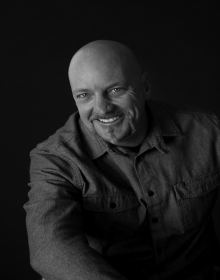 by Luke Schmaltz
by Luke Schmaltz
David and Goliath are at it again. This time, they are playing out the roles of underdog and oppressor on the unlikeliest of proverbial battlegrounds — the Park Hill Golf Course.
This classic duel has been staged across the Mile High City for decades: A large developer with deep pockets acquires valuable real estate. Then, they set out to build upon the property in dimensions that do not resonate with longtime residents of the surrounding community. Most often, the neighborhood stakeholders lose, but this time the big dog has a hitch in its get-along — a handicap — if you will.

Bird’s Eye View: This is the purported long-term development of the Park Hill Golf Course plan presented by Westside Investment Partners. Critics indicate there will be nothing to stop Westside from turning the rest of the open space into high density units. Image courtesy of Westside Investment Partners and The Holleran Group
Currently the 155-acre Park Hill Golf Course (PHGC) is encumbered by a perpetual conservation easement which, according to the assigned legalese, “Limits use of the property to open space in general and a golf course in particular.”
From the early 1980s until recently, the PHGC was privately owned by the Clayton Foundation. In 2019, Westside Investment Partners purchased the property at a total price tag of $24M. In addition to the conservation easement, the Glendale-based developer faces another obstacle; an organization called Save Open Space (SOS) Denver. Their website states they are, “A grassroots community group focused on the future of the Park Hill Golf Course land.”
Silence The Protestors
SOS Denver spokesperson Harry Doby is deeply immersed in the fight to preserve the massive stretch of grass and trees adjacent to his home. Yet, Doby and his fellow SOS members have faced staunch opposition from the City of Denver. Recently, a comprehensive protest petition signed by adjacent property owners and businesses against rezoning of the land was rejected by city officials, despite the fact that Doby and company followed all rules for filing described on the city’s website. When questioned, the city stood by their rejection of the petition, stating in vague language via email that th

Rendering: Developers present idyllic artist renderings of what the project might look like upon completion. Denverites are skeptical as often the actual finished project is much different than the rendering submitted by Westside. Image courtesy of Westside Investment Partners and The Holleran Group
e documents provided did not meet the legal requirements. “They invented this rule simply to stop our process,” says Doby. “The city has a single-minded obsession with developing this green space. Westside knew going in they had no development rights.”
As a result of ousting the voices of local property owners and businesses, Denver City Council cast a majority vote of 11-2 to place the issue on the April 4th Election Ballot. Now, the decision whether to lift the conservation easement is going to be left up to Denver voters at large under Proposition 2-0.
Grease The Wheels
A city-wide vote on the fate of PHGC is troubling for Doby and other Park Hill residents, as it could allow Westside Investment Partners to cast a citywide net of influence in order to sway the vote in their favor. Doby and his colleagues at SOS Denver anticipate exactly this. “The $24M [PHGC purchase price] is a drop in the bucket for them,” Doby says. “A multi-million dollar ad campaign is another drop in the bucket.”
Westside has made a well-documented series of generous donations to Mayor Hancock’s administration as well as to the majority of city council members. In a January 23 article, Denverite reported, “The company [Westside] and its entities and staff have made over $41,000 in political contributi

Civic Group: Yes for Park and Open Space aims to stop the development of Park Hill Golf Course. Image courtesy of Harry Doby
ons to Denver City Council members and the mayor since 2017.”
The First Salvo
In response to the April 4th ballot measure, Doby and his SOS Denver colleagues formed Yes for Parks and Open Space, anchored on the slogan “No On 2-O.” Doby continues, “We are in a climate crisis, we are on a heat island. Preserving the green space is to our health and environmental benefit. There is development happening around Park Hill Golf Course as we speak, including affordable housing. There’s a project at 38th and Holly that is going to build 253 affordable apartments and townhomes. Therefore, it would be squandering our limited resources. You can replace green space, but you can replace warehouses with housing. The smart place to build is redeveloping dilapidated commercial and industrial properties.”
A Daunting Retort
Not to be outmaneuvered, Westside quickly rolled out a supporting initiative of their own, the similarly-branded Yes for Parks and Homes. A thorough, impressive, and artfully rendered presentation deck lays out a dazzling array of development benefits. Features include the 303 ArtWay Heritage Trail, a grocery store, rail and bus transit access, the city’s fourth-largest regional park, a community center and 2,500 new homes — including

Upcoming Election: Park Hill Golf Course has been an oasis in urban Denver since 1930. It will cease to be if Westside Investment Partners can get voters to approve its development plan on the April 4 election.
rental and for-sale housing. The language leans heavily on the “affordable housing” theme, while providing rendered images of a utopia-like urban paradise of grassy recreation areas, food truck gatherings, spacious pathways for bikes and pedestrians, playgrounds, basketball courts, outdoor seating areas, retail storefronts, and modern multi-level housing structures. The “Why We’re Here” section cites a “City-wide shortage of high-quality affordable housing.” Meanwhile, the “Binding Commitments” section cites that over 100 of the 155 total acres will be, “Conveyed to the city for parks and open space.”
Organizational Support
Additionally, Yes for Parks and Homes boasts a bevy of high-profile endorsements from organizations such as Habitat for Humanity, Black Business Initiative, YIMBY Denver, Volunteers of America, and many more. Company principal Kenneth Ho brings an impressive resume to the table, having served as the former chair of the Denver Planning Commission with an MBA and a master’s in urban planning. Ho is quick to emphasize Westside’s commitment to preserving a large portion of the natural grounds. “We recognize the need for open space, that is why we’ve got more than 100 acres here,” he says. “We also know that we need to have affordable housing in this region. We need to have places that foster community, and we need to have access to fresh food and economic opportunity. That’s why, when it comes down to it, this is about a ‘both and’ versus a ‘neither nor’ situation.”
Something For Everyone
Westside’s plan includes a “Guaranteed Affordability” section based on Denver’s Area Median Income (AMI). Provisions include 25% of the development’s total residential properties for “deeply affordable housing options,” and “at least 550 permanently affordable units split between rental and for-sale Income Restricted Units (IRUs),” as well as 300 entry-level homes, 60 IRUs for senior housing, 40 units for permanent supportive housing, and at least 150 IRUs for family housing.
Westside emphasizes the immediate need for affordable housing in Denver, yet the timeline on delivery of their contribution to this need is vague. “It will probably be in three phases starting from the south to the north,” says Ho. “It’s hard to predict how the City and County of Denver approves plans and gets building permits out, so we anticipate that it would probably be three to five years.” This projection is for the first phase only, leaving prediction of subsequent phase completion up to speculation. Based on the above guess, however, completion of the project could take up to 15 years.
An Outspoken Ally
While Westside’s development proposal is alluring in its current digital form, the long-term layout is cause for more immediate concern. Lifetime Park Hill resident, activist and community leader Terr

Mayoral Candidate: Denver Mayoral candidate and lifelong resident of Park Hill, Terrance Roberts, has some definitive opinions on Westside’s development plan. Image courtesy of Terrance Roberts for Mayor
ance Roberts — who is also a candidate in the 2023 Mayoral race — has a few homegrown observations on the matter. “For someone who doesn’t understand the area, like someone from Regis or Cherry Creek, these drawings look pretty darn good,” he begins. “Developers keep using the ‘affordable housing’ term but it’s deceptive. Affordable for who? We don’t need that, we need public housing. We are already dealing with gentrification, and many of these so-called ‘affordable housing’ units stay empty. Plus, if something has already been designated as open space, why are you ramming through a development plan?”
Roberts is also quick to point out the imprudence of putting the fate of Park Hill Golf Course on the April 4th ballot, as it is a hyper-localized issue which is largely irrelevant to people other than Park Hill residents. “I don’t think it should be a city-wide vote because that is just a tactic. Most Park Hill residents won’t go for it,” he says. “The fact that they knew there was an easement in place and they purchased it anyways means they are used to pushing developments through government channels and getting their way. This whole process is very condescending to people in Park Hill. The majority of residents in this district have already said no to this. Plus, there’s already a development at 38th and Holly.”
Final Positions
Regardless, Westside is committed to the merits of their vision and convinced they will be successful at the polls on April 4th. Company spokesperson Bill Rigler of Greenlight Strategy declines to comment on what may become of Westside’s $24M purchase should Denver voters say no to the lifting of the conservation easement. “Westside has spent over four years developing this plan and proposal,” he says. “We are more excited and focused on what that proposal for action is, especially after having received 11-2 approval from City Council to put this on the ballot.”
Doby, SOS Denver, and Yes for Parks and Open Space are similarly confident. In a recent Denver 7 News interview, Doby attests, “We’re going to win, it’s just a matter of time. The Park Hill neighborhood and Denver in general know that this is a rotten deal, they are being sold a bill of goods, and they are not going to stand for it.”

by Regan Bervar | Jan 19, 2023 | Editorials
“Entrepreneurs and their small enterprises are responsible for almost all the economic growth in the United States.”
 by Luke Schmaltz
by Luke Schmaltz
At first glance, “magic” mushrooms and marijuana seem to be kindred commodities. Both have deeply stigmatized perceptions which are softening due to the myriad benefits of their consumption.
Yet, when examined through an economic lens, these elements are less like siblings and more like distant cousins.
The “green wave” was one of the most significant economic and social events in Colorado history. According to the Colorado Department of Revenue, state-licensed sales of marijuana have exceeded $13.4 billion since 2014 — resulting in $2.3 billion in tax revenue.
Not So Fast

Decriminalization: Local mushroom entrepreneurs contend that decriminalization of psilocybin will not lead to another “green wave.”
Yet, marijuana’s fungal counterpart — mushrooms containing psilocybin — are having a much more subtle impact. In November 2022, Colorado voters approved Proposition 122, which decriminalizes the possession and consumption of psilocybin while making it legal to grow over 50 species of mushrooms within the Psilocybe genus.
This piece of legislation sets a legal precedent, making Colorado the only state in the union aside from Oregon to decriminalize at this level. This does not necessarily mean big business is lining up to throw capital investment dollars at mushroom-based startups. Rather, according to some, this burgeoning marketplace will be relegated to scrappy, niche-savvy entrepreneurs who have already been hard at work building an economic framework to support the needs of psilocybin consumers.
Organic Roots
Monster Mushroom Company is one such enterprise, headed by a Denver — based entrepreneur, who introduces himself simply as David. The company manufactures and markets grow kits designed for those who aim to cultivate mushrooms for private consumption. “I started growing mushrooms about 15 years ago as a personal hobby,” he begins. “I got pretty good at it but didn’t do anything with it except to occasionally grow for myself and friends.”
David talks about his personal journey of growth and healing through psilocybin mushrooms. “I was able to solve a lot of personal issues through microdosing. I was able to get off SSRIs (antidepressants) and other medications. Then, in May of 2019, they decriminalized mushrooms in Denver, and I thought to myself, ‘There’s got to be a business opportunity here.’”
To clarify, the May 2019 passing of Initiative 301 deemed the prosecution of psilocybin “the lowest legal priority” according to Decriminalize Denver — the political action group who introduced the measure.
Opportunity Knocks
“Since I already knew how to do it, I started making the grow kits,” David continues. “I went to a grow store called Cultivate, and said, ‘I have these grow kits I’ve been making and I would love to get them on your shelves’ and they gave me a shot. Basically, no one else was really interested at the time, but they saw the possibilities and they started selling our kits. It’s been a long stair-step,” he explains.
“I got into one store, then into five stores, and now I’m in about 120 stores nationwide,” He continues. “It started in my basement and garage, and two years ago we moved to a 3,300 square-foot, climate-controlled warehouse facility in Wheat Ridge. That was not easy because no one wanted to rent to a startup company, especially not in a taboo industry like the mushroom industry.”
Its Own Monster

Grow Kits: Monster Mushrooms Grow Kits are affordable and usable by just about anyone. Photo: Monster Mushrooms
While Monster Mushroom Company’s operation doesn’t parallel the massive labor teams necessitated by the large-scale cultivation of marijuana, the small but mighty enterprise does have its own distinct type of economic impact. “We’ve created over nine jobs,” David begins, “My business partner is a single mom working hard to support herself and her kids. She is also a practicing Mycologist, which is the study of mushrooms,” he explains. “We are cash flow positive, and we are paying all of our bills, but it has been an uphill slog without a doubt.”
“There are all kinds of people who think of this as the new cannabis, which it is not,” David attests. “I don’t see it (psilocybin) ever becoming legal for recreational purposes, at all, and I’m happy about that. It’s a powerful drug. I spend at least 25% of my day on the phone answering questions from people who say, ‘Hey, you guys sell mushrooms?’ and my answer is always, ‘No, we do not grow or sell mushrooms, we merely supply the materials so that you can grow your own.’”
Beware The Uninformed
“Then, they’ll ask, ‘Where can I buy them?’ and I’ll say, ‘It is legal to grow, possess, and consume mushrooms in Colorado but it is not legal to buy or sell them.’ I doubt you’ll ever, in our lifetime, be able to walk into a dispensary and buy a half-ounce of mushrooms,” David says. “There’s just too much risk. If we just open this up to recreational use and there’s tours coming through here, people are going to get more messed up than they know what to do with, and it’s not going to be a good situation.”
“I firmly believe in this medicine for therapeutic use,” David says. “But the people who were against Proposition 122 thought the same thing that happened with cannabis was going to happen with mushrooms. They thought the guys in suits would come in and turn this into a big corporate money-making machine. I certainly hope that does not happen. Allowing people to grow their own plant medicine is a wonderful thing. But I don’t see this becoming a full-on Amsterdam where you can go into a place and buy a sack of mushrooms.”
“Therapeutic use is great and I’m a proponent of microdosing, but I place a strong caution on use,” David says. “People can smoke cannabis four or five times a day or more, you’re definitely not doing that with mushrooms. That’s one of the reasons why I don’t think it will be the new cannabis. People don’t consume mushrooms four or five times a day — it just doesn’t happen.”
Far Cheaper Than Weed
From a practical standpoint, David points out that anyone interested in growing their own mushrooms can do so with a low investment. “Less than 100 dollars will get you everything you need,” he explains.
As a former cannabis grower, David is quick to point out the drastic differences in what it costs to grow fungus versus weed. “It costs a lot of money to grow cannabis,” he begins, “Equipment, lights, nutrients, you name it. The electricity alone is astronomical. But you can grow a batch of mushrooms in your closet for almost nothing — just 100 dollars to get you going and nothing else — no lights, no nutrients, they will grow in a small environment, and you don’t need to dedicate a whole room of your own house.”
Future Growth
Not only has Monster Mushroom Company created quite a few jobs, they are supplementing a local cannabis industry that has fallen on tough times. “We have a couple local retailers who have indicated that they wouldn’t be open right now if it weren’t for the mushroom supplies they were selling.”
“We’ve got a couple chain stores, but 90 percent of our business is mom and pop retail chain stores,” David says. He cites local sole proprietorships such as Mile Hydro in Lakewood and Aurora Hydroponic who claim to be selling more mushroom growing supplies than anything else.
“We also work with bigger chains such as Cultivate and Way to Grow. We are everywhere that has decriminalized mushrooms such as Washington, D.C.; Santa Cruz, CA; Oakland, CA; Detroit, MI; Ann Arbor, MI; and a couple places in Massachusetts,” he says.
Unlike marijuana’s “green wave” of big business, the mushroom boom is destined for a different path. The benefits of this grassroots economic movement will be realized incrementally and enjoyed by mom-and-pop pioneers like Monster Mushroom Company.
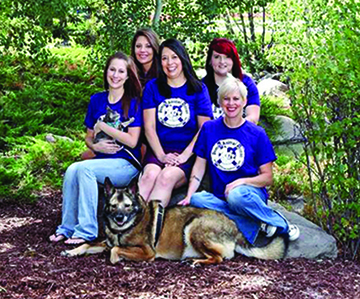
by Regan Bervar | Jan 19, 2023 | General Featured
“Inspiring hope in a cynical world might be the most radical thing you can possibly do.”
 by Luke Schmaltz
by Luke Schmaltz
Every once in a while, a childhood dream matures into an inspirational, sustainable, ongoing pursuit.
In the face of an increasingly apathetic world, Demi Merrit and company have managed to do exactly this — harnessing compassion, empathy, and charity to improve the lives of Denver’s less fortunate, four-legged residents.
Demi’s Animal Rescue Thrift Store and Cat Lodge is a 501c(3) nonprofit organization located at the Denver/Aurora border near East Evans and Holly intersection. Their website states that the five-person staff is focused on, “…solving pet homelessness through adoption, spay/neuter, and pet retention. We do not discriminate against any animal that is in need and open our door to all regardless of their breed, age, or special care required. We strive to see the day that pet homelessness is eliminated worldwide.”
True Grassroots

All animals adopted through Demi’s have passed an examination by a licensed veterinarian. Photo: Demi’s Animal Rescue
Demi’s Animal Rescue (DAR) was founded in 2010 in Merrit’s basement when she was still in high school. She discovered her passion for animal advocacy while volunteering, doing fundraisers, and fighting to end breed specific legislation. She eventually began helping people in the community with emergency vet bills and then, with the blessing of her parents, she began fostering animals in “cat rooms” built by her family. From these humble beginnings, DAR was grown into what it is today — a place where animals can grow, improve, rehabilitate, and find homes.
Adoption Is Easy
Meanwhile, DAR’s Development & Operations Manager, Jessica Roeger, encourages anyone interested in pet ownership to work with shelters and rescues. She offers insight into the ease of the adoption process. “We try to make adopting from a rescue an enjoyable experience,” she begins. “We have a short application that is required to be submitted if you are interested in adopting. From there, it is typically reviewed within 48 hours, and we can schedule a meet and greet with the animal(s) you are interested in. If there are concerns on the application, we like to educate people in hopes that we can approve the application after that discussion. An amazing home can’t always be chosen based on a questionnaire which is why we like to engage in conversation to get a real idea of who they are.”
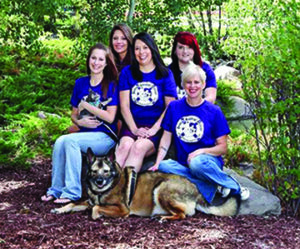
Demi’s Animal Rescue is operated by five staffers and numerous volunteers.
DAR’s current facility was opened in 2021 and features a few unique distinctions. The premises, “…provide two free-roaming adoption rooms for cats that have helped to increase the number of lives we can save,” Roeger says. “The Cat Lodge also provides a space for some of the most at-risk cats including FIV+, bonded pairs, seniors, and shy cats. Since being founded in 2010, we have grown every year in terms of adoptions, fosters, lives saved, and funds raised.”
A Thrifty Twist
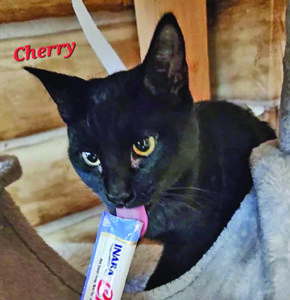
Cherry enjoys a treat at Demi’s Animal Rescue. Photo: Demi’s Animal Rescue
Roeger explains how the thrift store aspect of the organization fits into the overall operation. “We wanted to get creative in providing income to the rescue so we can continue to grow, which brought the idea of a thrift store for sales to help support the rescue. It took a lot of planning and a lot of rejection before we finally found a landlord willing to rent out space to a non-profit, but our determination paid off.”
Roeger continues, “All sales from the thrift store help support the daily operations of the rescue. The extra income allows us to save more lives and to take on more complicated cases, such as an animal with medical needs or behavioral issues. Having the thrift store and adoption center has also helped get our name out more into the community, which has increased interest in adopting, volunteering, and donating.”
An Endearing Mission

Demi’s Animal Rescue Thrift Store features high-end clothing, accessories, household items, and more.
In addition to adoption services, DAR also helps with pet retention for struggling animal owners. Roeger encourages people to reach out to local organizations for help before giving up. “If you are struggling with food, supplies, basic veterinary care, or training, there are places dedicated to helping with some of this or rescues willing to assist, including us,” she says.
“We place a large focus on helping animals that are the most in need, which is why you may not see as many animals come through our rescues as others,” Roeger continues. “We ensure that every animal is healthy (veterinarian approved) prior to adoption. We address behavioral issues so that we can ensure success for both an adopter and an animal. When you adopt from us, or support us in another way, you can ensure that the extra mile is being taken for all animals and that we will provide support in any way possible.”
DAR welcomes donations of clothing, household items, books and DVDs. Demi’s Animal Rescue Thrift Store features plenty of the above as well as high-end boutique items, name brand clothing, and more. Shoppers are welcome Wednesday through Sunday from 11 a.m. until 6 p.m.

by Regan Bervar | Dec 16, 2022 | Main Articles
“Space has the ability to produce a triple bottom line, or ROIII: Return on Investment, Innovation, and Inspiration.”
 by Luke Schmaltz
by Luke Schmaltz
NASA’s Artemis I rocket launched on November 16, 2022, with re-entry and splashdown on December 11, 2022. This demonstrated the first major goal of bringing a human-rated spacecraft to space.

The Orion Capsule is perched atop the Artemis I Space Launch System. Image: eandt.theiet.org
The towering monstrosity of hardware stands at 90 meters (322 feet) and was built to the tune of $40 billion, a number projected to double in the next few years as the project moves forward. The growing aerospace economy is made possible, to a large degree, by a contingency of Colorado-based companies making space exploration possible. The imminent objectives of the Artemis 1 project involve an unmanned mission to the moon, followed by manned missions designed to establish a populated base camp near the south pole of Earth’s celestial sister. This will provide the necessary research and lay the groundwork for a similar mission to Mars.
Mankind’s last trip to the Moon was in 1972, aboard the final Apollo 17 mission. In the 50 years since, aerospace technology has transformed amid revolutionary innovation. The current landscape of the industry presents a hybrid collaboration of government agencies and private sector companies working together to return humans to the surface of the Moon.
Lockheed Martin Space
Atop the towering Artemis I Space Launch System (SLS) sits the Orion capsule — primarily built and engineered by Lockheed Martin Space, a Denver/Boulder-based company. This spacecraft has been specifically developed to take human beings deep into space. State-of-the-art technology includes advanced propulsion, communication, navigation, radiation protection, and life support systems. The capsule also features the biggest heat shield ever built which will protect astronauts as they re-enter Earth’s atmosphere. Currently, the company is contracted for six Orion missions with a potential six more on the table. In the upcoming Artemis III mission, Lockheed’s Orion capsule will enable the first woman and the first African-American to set foot on the Moon.
Maxar
Once the Orion capsule reaches the Moon, it will dock into Gateway, an orbiting spaceship which will serve as a communication hub and staging area. A Westminster-based company, Maxar, develops the Power and Propulsion Element (PPE) which makes altitude control, movement, and maneuvering possible through electricity-generated bursts of ionized atoms. This sustainable approach removes chemical propellants from the equation as astronauts use the Gateway module to make their final descent to the lunar surface.
Advanced Space
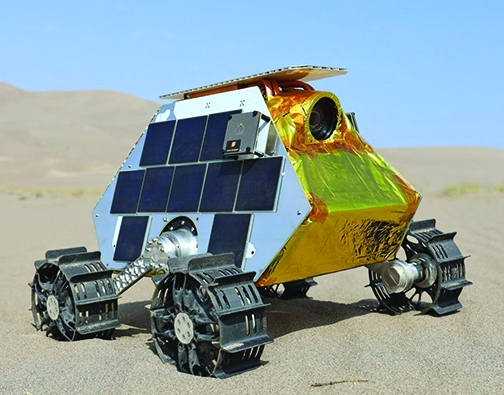
Lunar Outpost’s MAPP rover will help establish wireless 4G/LTE lunar communications. Image: moonmarkets.moonvillageassociation.org

Humanity’s return to the Moon is largely empowered by Colorado companies. Image: pbs.org
Based in Westminster, this team of innovators recently launched CAPS, the Cislunar Autonomous Positioning System. According to the company website, this piece of orbiting technology will “serve as a pathfinder for NASA’s Artemis program, and demonstrate our proprietary peer-to-peer navigation capability…” The unorthodox orbit of the microwave oven-sized module will provide uninterrupted communication with Earth by passing within 1,000 km of the Moon’s surface at the South Pole and then traveling in a twisting elliptical path to as far as 40,000 km from the Moon’s North Pole. Proper and precise execution of this near rectilinear halo orbit (NRHO) will act as a pathfinder for the Gateway spacecraft and ensure it maintains a constantly unobstructed view of earth.
Lunar Outpost
NASA’s lunar astronauts will eventually be establishing a manned base at the Moon’s South Pole, at which time on-site communications infrastructure will be essential. This Golden-based robotics company leads the private sector in the potential monetization of lunar infrastructure (the cislunar economy) while positioning themselves to be a successful NASA partner. Currently, they have partnered with Nokia’s NASA Tipping Point project along with Intuitive Machines to build, establish, test, and integrate the first ever 4G/LTE network on the surface of the Moon.
In late 2022, Intuitive Machines will deliver numerous payloads via their Nova-C lander. This will be remotely operated to install a low-latency, long-rage, wireless communications network. This system will include transmission modules and antennas, which will be deployed by Lunar Outpost’s M1 MAPP (Mobile Autonomous Prospecting Platform) rover — a surface vehicle the size of a small dog which will be operated remotely from Earth.
These companies represent the tip of the Colorado-based aerospace iceberg. An estimated 180+ additional companies are working to contribute to revolutionizing humanity’s interaction with space in one way or another. While lunar exploration seems to have gone out of style over the last 50 years, there’s a new attitude on the horizon. The cislunar economy is once again inspiring the aerospace industry to shoot the Moon.



















